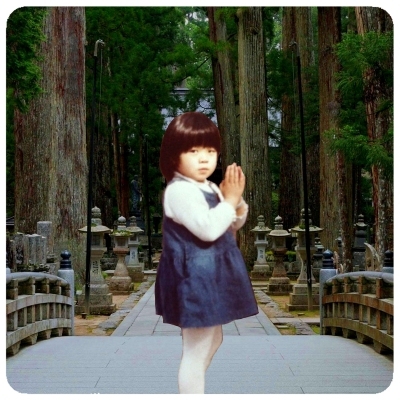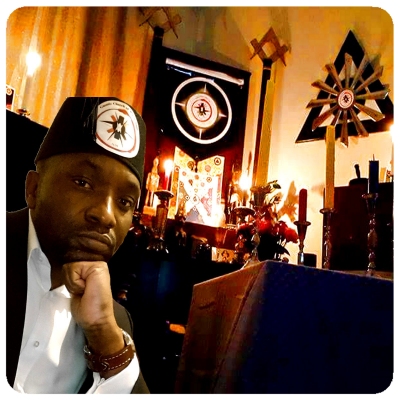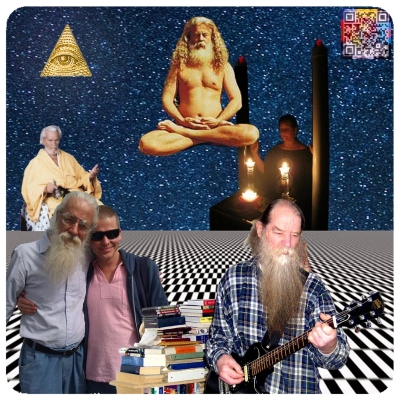
Episode 6: Saori Nishi Da
[00:35:43] September 1st, 2015
scroll down for a written transcript of the interview.

or listen through:
or through the RSS feed.
  |
 |
  |
BT: Hi, Saori, welcome to The Esoterinerd Podcast. Would you mind telling us a little about the meaning of your name?
Saori: Okay, my name is Saori. Is made by 3 words. I mean "Sa" and "O" and "Ri", 紗緒理, named by my grandfather. Every Kanji have various meanings. For me, "To be elegant and clever."
BT: Well you are certainly both elegant and clever. And, your surname, Nishi Da?
Saori: Well, my family name is so-so common in Japan. I'm not sure about the meaning, but I guess from the Kanji. Maybe it means, "The Rice Paddy of the West," because Nishi meaning West, and Da meaning Rice Paddy.
BT: And that would make sense, considering Osaka is on the western side of Japan... has your family always lived in Osaka?
Saori: Yes, we have lived there. My parents are born in Osaka, and grew up. Me too.
BT: What was it like the first time you went to Mount Koyasan?
Saori: Okay, my first visit to Koyasan is maybe when I was three or four years old, so I don't remember my first visit. After that, I grew up. I think I was a college student. I went to there and stayed at the Temple. I can't remember why I want to go. Maybe I wanted to feel spiritual power. When I go out the small tunnel and enter the Koyasan, I feel super clean air. It is include spiritual meaning. Everything are beautiful, deep green, woods, old cemetery, so calm. I think it was truly holy mountain. Temple of the higher mind. Not fear, just something like pureness. Kind of the origin of our mind!
BT: We only went for about three hours. So, as soon as we got to the mountain top, we got on the bus and, of the fourteen stops, we went to the one right at the heart of it, right at the oldest part of that sprawling cemetery where the famous Samurai are buried, and saw that Temple, and it was an incredibly beautiful experience. When you went, which Temple did you go to specifically, and how long did you stay there?
Saori: I have stay there two times, just one day for each. At first time, I stay alone at Jyo-fuku-in Temple. That was very interesting Temple. They had a shrine of Myanmar Buddhism. The other time I stay at Fukuchi-in Temple with my friends. They have a beautiful garden. It made by Mirei Shigemori, who is a famous gardening artist. Every Temple seems to be simple life. We get sleep early than usual, maybe 9 or 10:00pm, and get up early. We can eat great vegetarian supper and breakfast in any Temple. It is really good. And we can join in the worship in the early morning. I think it start at 6:00am, before the breakfast. The monks chant a Hannya Shingyo, and they give a preaching for us. The alter of Shingon Temple are dark, it make a mood much mysterious. I really recommend that experience!!
BT: Which Temple was it, where you got the CD that has the track on it that I now use for the intro and the outro of The Esoterinerd Podcast?
Saori: I got that CD at my first Temple, Jyo-fuku-in. The composer is son of that Temple, I think.
BT: I have to say, the gifts that you've given me that are now in my Temple have really transformed the whole experience of being in there. It was primarily a Western ceremonial, you know, Golden Dawn style Temple that oddly had this Buddhist statue in the middle of it, but between the Kimonos, and the Hannya Shingyo banner that I have hanging on the double cubical altar, you said your parents made that?
Saori: Well, my parents are interested in Japanese cultural history and research them. The tapestry, what I gave you, is their original works. They use Japanese traditional textile method. My father cut the template, like Hannya Shingyo or Gods, and my mother printing it by indigo, I mean bleaching the pattern. We mention that is not special item. I think it is a little different from Kimono on your common image. Maybe Kimono as your image is use for rich people. Indigo cloth are used as more daily stuff for every people. Some hip people enjoy what the color changed like vintage jeans. and it made by cotton too. Expensive Kimono made by silk.
BT: And then there's the two banners that I have hanging in the East.. what were the names of those hanging scrolls?
Saori: Oh yeah, we called it "Kake Jiku" or "Jiku." It usually hanged at alcove called Tokonoma. Is special display place in Japanese room. Kake Jiku have a various pattern of the art. Sometimes Buddhism motif, like yours, the others paysage or writing a poems or quotes. So many patterns.
BT: Now there's the two that you gave me, the one on the right has the Kannon in the middle, and the Goshuins surrounding it, the Temple Seals from all of the various Temples in Japan. Then the other one, which I'm going to be putting up on the left, you mentioned had to do with Pure Land Buddhism, which was the religion of your ancestors. What can you tell me about that Kake Jiku?
Saori: I remember the second roll had a big chant: "Namu Ami Da Butsu." It is the name of Amitabha. I think it's pertly similar "Amen." My family religion are called "Jodo Shinsyu," beginning in over 800 years ago. It is one of the biggest Buddhism sects in Japan. The master his name is Shin-ran, said that everyone allowed to go to the Pure Land, meaning like a heaven, after death, only with chant, "Namuamidabutsu." Even if they are guilty, everyone permitted.
BT: Would you mind demonstrating how that chant is performed, so that I can do it, you know, authentically?
Saori: Well, if have a variation. For example, before the ceremony, we just repeat it like this... Sometimes like a song in a hymn, like this...
BT: Thank you very much, I will incorporate that into my practice. I will perform the second one on behalf of all Beings, that everyone might be allowed back into the Pure Land, and I will do so in honor of your family. I was curious about something. When you were here, and we did those Rituals together in the Temple, what was that like from your point of view?
Saori: I was very excited. It was so interesting experience for me. I had no idea I could join your work! Thank you so much. I already know the name of Golden Dawn before. Actually, I really interested in secret world. So, when I was teenager, I read some book about mystery and spiritual studies. While I was in your Temple, I feel something, like altered states in myself. I can't explain in words, but I think it just mysterious experience. To the music that you send to me, the strong bell sounds are bring imagination for me like unknown world. I think that every way or religion has a pure desire as good meaning. I mean to looking for the life on higher mind. It is a great spiritual journey for everyone. I think no matter what we believe, the important thing is how do I perform for toward higher level.
BT: When you and I first became friends on Facebook, it was because we had so many friends in The Source Family, Djin Aquarian, Isis Aquarian, and so on. How is it that you ended up having so many friends in The Source Family?
Saori: I have to say first, I had never met them except you and Janey. I just their fan. At first, I find the music of Yahowah13 at the music store, when I was high school student. I like their music very much, and impressed their lyrics. I think Father Yod and their family try to discover the truth of the world. They have a pure spirit. So they give me a opportunity that thinking about good things. I think they also want and to be a higher level and search it. Therefore, they always give me a great imagination. I respect them.
BT: I remember on the day that I met Isis Aquarian, was also by coincidence the day that I met Djin Aquarian on the phone, and he had given me the name "Pymander Aquarian." Then, a few hours later, I went downstairs from where I was working at the time, at The Screen Actors Guild. I met up with Isis, and there was a big open area where we had some privacy. So, we sat in lotus position and talked about everything. One of the things I mentioned was that Djin had given me the name Pymander Aquarian. She had said that she felt that people should be able to choose their own names, and proclaim themselves as members of The Source Family. What about you, Saori? If you could choose your name, what name would you choose?
Saori: Oh, well, it's a very interesting question. Well, it very interesting question. Hmm, well, let me see... I think... if I choose the name, I might be choose "Waterfall" because it made a river, sometimes origin for life line, and keep on moving.
BT: Then it is my honor to be the first to greet you, Waterfall Aquarian. (*gong*) It also seems appropriate considering waterfalls are like artists in a way, sculpting the rock, and you are an artist and a sculptor. What was it you were saying the other day, about feeling like a serial killer washing bones off in the sink?
Waterfall: I use some bones for my art works from a year ago. Some people think that I am crazy, but I don't think so. It is just my leftovers. I eat a chicken or pork. You know, we can't eat bones. So I try to use it as a recycle. It can be my meal recording. I need a many process to remake. And it easy to corruption, especially in the summer. So I washing bad smell bones in that process. For me, it make me mad. Sometimes I think about that mind of psycho killer. I mean.. they might wash something in the bathroom, like me. I don't know that they have some process or not... I should say I don't make it. I just modeling them, because bones are made by great nature. The nature beauty is most beautiful in the world, I think. We have to respect creativity of the universe.
Pymander: Excellent! So, the pieces that you're working on now, are they going to be on display in a Gallery soon?
Waterfall: Yes, I have a small exhibition at Osaka in October. it will be the first time to display the bone work.
Pymander: Very cool, so if anyone listening is going to be in or near Osaka in October of 2015, look up Saori, I'll post a link to her Facebook page. What can you tell us about candle making?
Waterfall: Yeah, also I make candles. Sometimes for a daily stuff, sometimes as artworks. It will display in October too. For me, my purpose to make a candle is very personal. I put my passion in it. When someone light a fire, it meaning that my imagination will be released. The candles are pretty similar the life. Burn, and disappear. Sometimes slowly, the other time fast.
Pymander: That is true. You mentioned, also, about how in Japanese tradition, you don't smell incense, but you listen to incense...
Waterfall: Ah yes, I think it's very interesting expression. In Japan, there is top three traditional art ceremony culture. Is Sado, Kado, Kodo. Sado is a tea ceremony, Kado is decoration of flower, and Kodo is ceremony of incense. In Kodo, sniffing of the incense is expressed as 'listening' to the incense, and as such, it is called Monko, because of much elegant word. They enjoy the various incense's aroma in a ceremony. Sometimes they play as game which difference aroma in various incense.
Pymander: Do you happen to remember the Japanese word for the Dorja, the lightning bolt symbol that Kukai holds in the statues, and that all the monks in the Shingon, when they pass away, they have their little Buddha statue in the mausoleum ho0lding the Dorje.. was the work "Kongo?"
Waterfall: You are right, it called "Kongo-sho." I think it's same Vajra that use as Tibet Buddhism.
Pymander: And then, when I mentioned the document written by Eihei Dōgen called "Fukanzazengi," you had said you knew it as a chant?
Waterfall: Oh yeah, I remember that you told me about Dogen. Dogen is master of Zen sect in Buddhism as Soto-syu. I don't know deeply about the sect, but Fukan Zazen Gi is very famous hymn. I remember the monks chant that sentence after the work of Zazen. Usually at night work. I think it need a long time to chant all. Maybe it take about 15 min. I can read the first part. Like this:
Pymander: Which I know by its English translation, "The way is basically perfect and all-pervading. So what is use purpose of practice and realization?" Thank you, Saori. And thank you so much for speaking with me today on The Esoterinerd Podcast.
Waterfall: Oh thank you so much, I'm glad you chose me as your interview. And, if I was a monk in the Temple, I should say, "Yokoso Omairi Kudasai-Mashita." It means, "Thank you for coming to pray." I'm looking forward to meeting you again. Peace to you. Sayonara.
Pymander: Yokoso Omairi Kudasai-Mashita. Sayonara.

